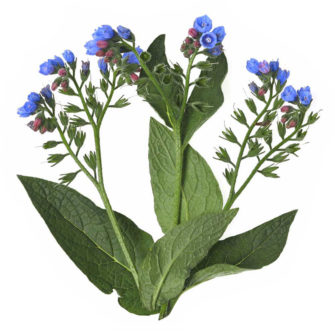The comfrey plant is a lesser known but useful herb that has been used for centuries in traditional medicine. Its uses are widespread and diverse, from the commonly known physical healing benefits to its use in natural pest repellents. Comfrey is most commonly used in products ranging from skincare to healing broken bones.
Comfrey Uses
- Healing wounds, bruises, and sprains – Comfrey is used to aid in healing broken bones, sprains, and bruises because of this ability to quickly stimulate cell growth.
- Joint pain – Comfrey has an analgesic effect on the pain in the joints. It produces local soothing effects that ease joint pains when used externally in the form of salves or creams and internally when taken as a tea.
- Skincare – It is often used as a skin conditioner and after it has been extracted from the leaves, it can be applied to the skin for various targeted indications such as scars, burns, cuts, and abrasions.
- Stomach ulcers – Comfrey is used to treat gastric ulcers, although it is not highly recommended. It is most often used as an antidiarrheal.
- Osteoarthritis – Comfrey has been used for centuries by native healers to help with pain and inflammation associated with osteoarthritis.
- Arthritis, rheumatism, gout, and fever – Comfrey is a powerful anti-inflammatory that can help alleviate symptoms of joint conditions, including arthritis and rheumatism.
Side Effects of Comfrey
Comfrey contains pyrrolizidine alkaloids which can be toxic to the liver. This chemical is associated with the development of lung and liver cancer in those who take a very high dose of comfrey over an extended period. For this reason, it is not recommended to take comfrey for long periods or in large doses.
Contraindications Related to Comfrey
- Do not take comfrey if you are pregnant or breastfeeding.
- Do not give comfrey to children under the age of 12.
- If you are taking medications that can affect the liver, talk to your doctor before taking comfrey.
- Comfrey should not be applied to open wounds. and should not be taken by mouth.
Origins of Comfrey
Comfrey is believed to be native to Europe and Asia.
My Favorites
- No Favorites Yet

